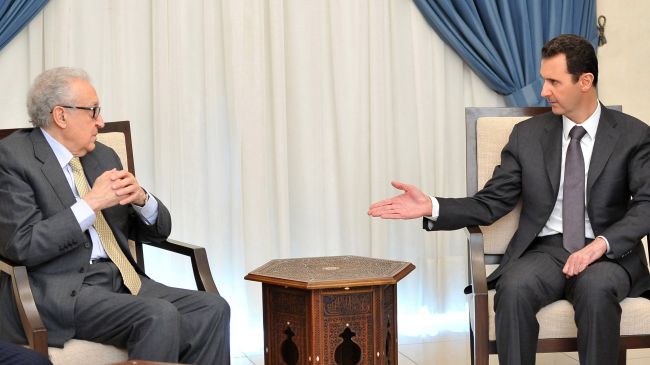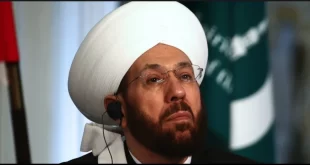Oct 30, 2013, Finian Cunningham
The answer would seem to be ‘yes’, as suggested by the latest tour of the region by the UN-Arab League special envoy, Lakhdar Brahimi.
In particular, it was the private message that Brahimi brought to Iranian President Hassan Rouhani that suggests the Algerian career diplomat is acting more as an interlocutor for Washington’s nefarious political agenda, rather than as an honest peace broker.
Brahimi is officially tasked with paving the way for the Geneva II conference aimed at finding a political settlement to Syria’s conflict. The Geneva conference was given new impetus by Washington and Moscow in mid-September, but a date for the event or the actual participants have yet to be fixed. That is what Brahimi’s latest regional tour was supposedly aiming to do, to form a consensus for negotiations to start.
Significantly, the UN envoy arrived in Tehran last weekend only two days before flying on to Syria. According to Al Monitor, Brahimi tried to “enlist Iranian help in the Geneva II conference on Syria”.
Brahimi met with President Rouhani, Iranian National Security Council Secretary Ali Shamkhani and Foreign Minister Mohammad Javad Zarif.
The Al Monitor report by Ali Hashem says, “According to Iranian sources, Brahimi – on behalf of the United States and other countries- proposed that [Syrian President] Assad only be a figurehead in a transitional government, with full power going to opposition parties.”
Brahimi also emphasized to Iranian officials that Geneva II “might be the only chance to end the bloody conflict” and he called on “Iran to exert pressure on the Syrian regime to show a genuine willingness to change its attitude”.
The Iranian officials reportedly gave Brahimi’s proposals short shrift, stating that President Bashar al-Assad must be part of any Syrian-led political solution and that no resolution would be found with the ongoing presence of foreign-backed militants.
Brahimi later found himself in hot water when he was quoted by several French and Arab media outlets as saying, “Syrian President Bashar al-Assad could help in the transition phase towards a new Syria, without leading it himself.”
When the envoy arrived in Damascus on Tuesday, he claimed that his views on Assad playing a transitional role were “misquoted”. And in a meeting with the Syrian Foreign Minister Walid al-Moallem, Brahimi appeared to defer to the Damascus government’s position that any dialogue at Geneva II must be “between Syrians, led by Syrians.”
The Syrian government said that it was willing to participate in the proposed conference “on the basis that it is the Syrian people’s exclusive right to choose its leadership and political future.” Damascus denounced the recent London statement made by Western powers and the foreign exile group, the so-called Syrian National Coalition. In neocolonial style, that statement calls for the removal of President Assad, and in effect pre-empts the outcome of dialogue before it has even begun.
In any case, the important point here is that Brahimi was carrying a specific and underhand political message to Iran. That message was for Tehran to toe the Washington line on Syria, by “exerting pressure” on its ally in Damascus to capitulate to the Western objective of regime change.
This functioning by Brahimi as a conduit for Washington is a reprehensible abuse of his official remit as a neutral broker.
But the attempt by Brahimi to induce Iran into an American line on Syria also throws new light on the parallel diplomatic rapprochement between Washington and Tehran over the long-running nuclear dispute.
It seems too much of a mere coincidence that just as Washington and its Western allies, Britain and France, have belatedly engaged in a political track over Syria – having recognized that their covert military tactic has become exhausted – that these same powers have ostensibly embraced a diplomatic thawing with Iran.
Recall that this sudden diplomatic track with Iran began only two weeks after US Secretary of State John Kerry acceded to the plan put forward by Russian counterpart Sergei Lavrov for chemical weapons decommissioning in Syria and a renewed push for the Geneva II political dialogue. That was 14 September. Then on 28 September, US President Obama made his “historic” phone call to Iran’s President Rouhani.
Ever since, Washington and its Western allies and their so-called Friends of Syria have been trying to pre-determine the outcome of any Syrian negotiations, and specifically to remove President Assad from power. Thus the Western powers are trying to win their objective of regime change in Syria on the political field, after recognizing that they couldn’t achieve this on the battlefield.
Initially, the diplomatic overture towards Iran extended by Washington, London and Paris was fulsome in praise for Iran’s “new attitude” to resolve the nuclear standoff. There is no doubt that Iran has every right to press for its diplomatic and national rights over the nuclear dispute and in particular to push for the removal of illegal Western economic sanctions.
Iran’s presentation of practical proposals this week in Vienna to the
UN atomic watchdog, the International Atomic Energy Agency, was described as a “serious and constructive” roadmap to allay any fears that its nuclear program might be for military purposes.
Of course, Iran is credible when it says that its legitimate nuclear rights are only for civilian applications. The trouble is, though, will Iran ever be able to satisfy its political enemies’ demands?
Recent scurrilous reports covered widely in the US media, including supposed serious outlets, such as The New York Times, USA Today and CNN, claimed that Iran’s advanced centrifuges enable it to “build a nuclear bomb within a month” – if it chooses to. Similar ridiculous scare stories have been put out by Israeli politicians and the dominant lobby group, the American-Israeli Public Affairs Committee.
In other words, the spurious specter of Iran representing a nuclear threat is in danger of always being invoked by Western politicians and media – no matter how unfounded those claims are.
Iran’s economy needs, and fully deserves, the immediate lifting of Western sanctions. The problem is that the Western powers seem unwilling to reciprocate and can conveniently justify their actions with false claims about the “Iranian threat”.
Last week, a senior White House official told media that there would no scaling back of sanctions on Iran “at the front end” of negotiations over the nuclear issue.
Ben Rhodes, a deputy national security adviser to President Obama, said, “We are not contemplating anything that removes those sanctions at the front end of any negotiation or agreement, because it’s going to be important to test Iranian intentions.” Rhodes added, “Before we could pursue sanctions relief, we’d have to see concrete steps by the Iranians to get at the state of their nuclear program.”
However, the White House has said that it was contemplating the unfreezing of up to $50 billion in Iranian assets as a way of bestowing sanctions relief “in installments”.
That sounds ominously like Washington and its allies are setting up a vice-like arrangement on Iran in which nuclear concessions for sanctions relief will never be enough. The purpose of such an arrangement is to coerce Iran.
Putting this vice over sanctions relief in the context of Western regime-change plans in Syria and the latest message to Iran via the conduit of UN envoy Lakhdar Brahimi to “exert pressure on Syria”, there is a serious possibility that Washington is trying to play Iran off its regional ally.
 Syria Support Movement solidarity with the Syrian people
Syria Support Movement solidarity with the Syrian people





